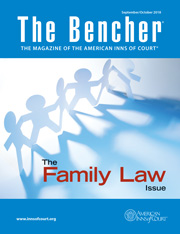Practicing Professionalism Does Not Conflict With Zealous Advocacy
The Bencher—September/October 2018
By Victoria E. Paone, Esquire
 Professionalism in the practice of family law encompasses far more than wearing a suit to court or arriving to an early settlement panel on time. Treating our adversaries and the court with civility and respect during the course of litigation is an integral component of professionalism. It is our duty as attorneys to make an active effort to help our adversaries, even when it goes against our instincts to win at all costs.
Professionalism in the practice of family law encompasses far more than wearing a suit to court or arriving to an early settlement panel on time. Treating our adversaries and the court with civility and respect during the course of litigation is an integral component of professionalism. It is our duty as attorneys to make an active effort to help our adversaries, even when it goes against our instincts to win at all costs.
Exercising professionalism and civility with our adversaries throughout the litigation, while still zealously representing our clients, is often difficult. This is especially true in high-conflict cases in which the parties may expect their attorneys to project the animus they have for their spouse onto the other attorney. However, professionalism and zealous advocacy can be simultaneously achieved. Indeed, there are small acts that we as attorneys can perform on a daily basis that provide the mutual benefit of showing professional courtesy to our adversaries while also benefiting our clients.
First, do not reject your adversary’s first adjournment request even if the reason for the delay appears to be illegitimate or your client does not want to prolong the matter. Believe it or not, this act can set the tone for the entire case. If you reject your adversary’s first adjournment request, your adversary is more likely to do the same when the shoe is on the other foot. While our clients may encourage us to say “no” more than “yes,” in situations in which the adjournment will not have any noticeable impact on our client’s interests, we cannot allow our client’s perspective to cloud our professional judgment. Inevitably, circumstances will arrive from time to time when your client will need more time to respond to discovery or to provide documents requested by an expert for a report to be completed. In those cases, you will seek the same courtesy that you have displayed to others.
Second, ask your adversary first before you ask the court for any relief. That is to say, do not file a motion before asking your adversary whether it is possible to settle some or all of the disputed issues by consent. Your adversary will be understandably annoyed if he or she receives a motion without being granted the opportunity to at least discuss these issues with you ahead of time. While your client may be breathing down your neck to run to the judge for immediate relief, the client should be advised that immediate relief is never granted absent exceptional circumstances. Moreover, the client should be advised of the potential financial benefit of resolving issues by consent without incurring the significant costs of motion practice. If you fail to try to resolve issues by consent before filing an application with the court, you are effectively communicating to your adversary that it is your intention to conduct this case by way of controversy rather than conversation. In short, get the “no” before you go to court.
Third, never refuse to speak with an adversary on the telephone. If you are worried about misinterpretations or miscommunications as a result of telephone communications, send a follow-up letter to confirm what was discussed. Open communication between attorneys is key to settling a case for your client prior to trial. In the same vein, if your adversary asks a question in a letter or leaves a message with a question, do not wait more than two days to respond to the question. If you do not have the answer because you are waiting to hear from your client, let your adversary know.
Finally, do not makes faces or talk under your breath when the adversary speaks during oral argument. This is rude and will not gain the respect of your adversary or the court. Likewise, weaving disparaging comments about your adversary into motion papers does not equate to zealous advocacy. Rather, it displays disrespect for a fellow attorney, while also dancing on the line of unethical behavior. Making firm arguments is different from engaging in conduct that is discourteous, unprofessional, and unethical.
These simple acts are often ignored or overlooked by both seasoned and rookie attorneys. In isolation these acts may not seem important, but together they can mean the difference between an uncontested divorce and a tumultuous trial. Help your adversary in order to help your client.
Victoria E. Paone, Esquire is an associate in the firm of Paone, Zaleski & Murray where she practices family law. She is a member of the Aldona E. Appleton Family Law American Inn of Court in New Brunswick, New Jersey.